Witchcraft creeps into public offices
The need to secure a job has become so critical, some Ugandans are resorting to witchcraft.
By John Semakula & Faustine Odeke
The need to secure a job has become so critical, some Ugandans are resorting to witchcraft. As those with jobs seek the services of witchdoctors to keep themselves in office, those without also turn to the same to oust them.
In Tororo district, former resident district commissioner Kennedy Adhola Otiti was recently accused of performing rituals in his office to block his transfer to a ‘dry area’.
Otiti was transferred to Alebtong. But sources said even after handing over office, he sneaked back into his former office with two ‘doctors’ to perform ‘rituals’.
It is alleged that some security personnel, who were on duty, saw Otiti and the ‘doctors’ struggling to unlock the office, before they got in and performed the rituals.
But Otiti laughed off the allegations, saying that was propaganda to tarnish his image.
“Even before I entered that office, some people told me there were charms. The story of witchcraft is not new. If I took the charms to the office, the Regional Police Commander, Peter Kakonge, who accompanied me there, must have been aware,” he said.
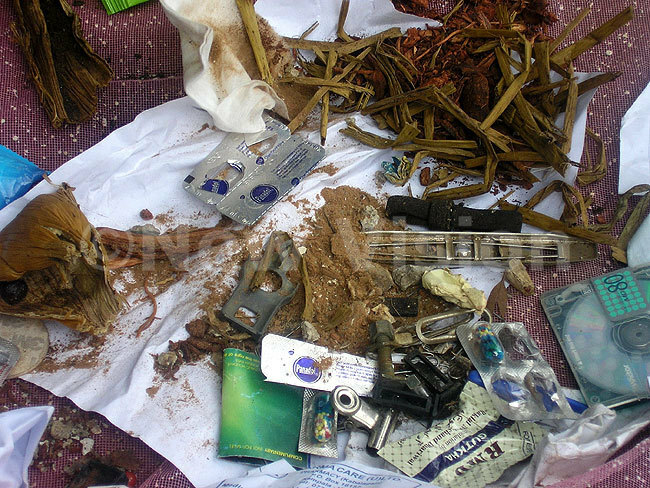
Fetishes including all sorts of items
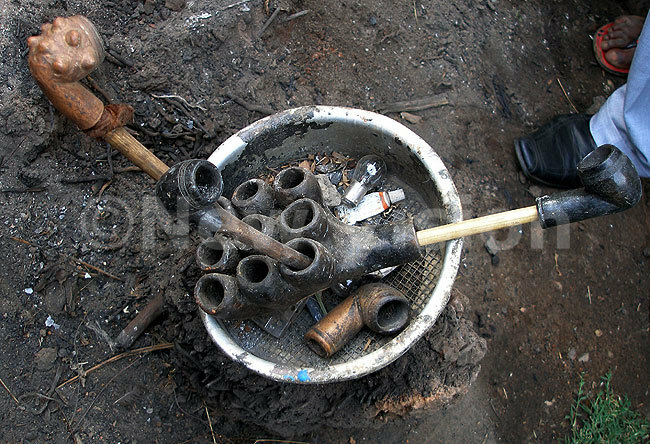
Smoking pipes retrieved from a shrine in Kibuli
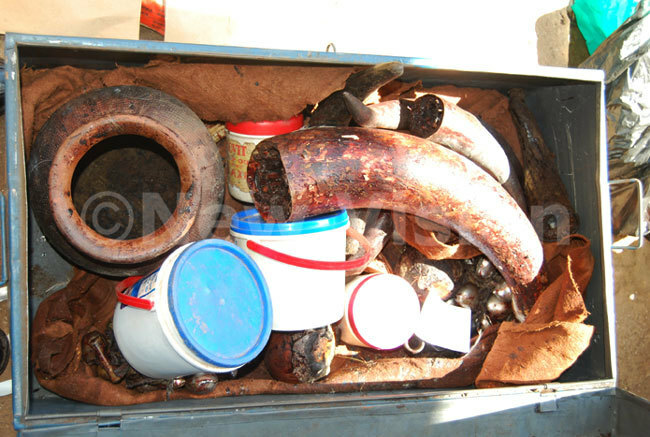
The witchcraft rumours reportedly caused panic at the RDC’s office building, which also houses the Malaba Regional Police headquarters and other district offices.
Following the rumour, Otiti’s successor, Modesta Bessie Ajilong, refused to assume office, before the building was ‘cleansed.’
Saturday Vision has learnt that Ajilong invited pastors Moses Widila of Ebenezer Gospel Centre, Amos Omoit of Deliverance Church and Gogo Amolon from Sironko to pray for the office. “I invited the pastors to bring an end to the panic that had engulfed the workers,” she said.
Not the only incident
But this is not the first public officers to have been implicated in practising witchcraft. In Masaka Municipality, the early retirement of former mayor John Tebyasa Matovu from politics has since been linked to witchcraft.
Towards 2011, Tebyasa developed a strange illness that affected his memory. Sources say he would spend money on cheap items and usually forgot to ask for change. Then rumours circulated that some members on Tebyasa’s executive bewitched him. Tebyasa had been mayor for three consecutive terms.
In 2011 in Kaliro, the then newly-elected district chairman, Wycliffe Ibanda, found fetishes under his chair, which his predecessors had used. Ibanda refused to sit on the chair.

This shrine belonging to a local traditional healer was once burned down by angry residents
Last week, Ibanda told Saturday Vision that his opponents seem to have given up on him because they no longer deliver fetishes to his office.
A few months ago, the sacking of the Busia district chairman, Ouma Adea, aborted after Police dogs sniffed fetishes in one of the chairs in the district council chambers.
The chair had been reserved for local government minister Adolf Mwesige, who was supposed to head the meeting. The meeting flopped and Adea is still chairman. He, however, denied links to the fetishes, accusing his detractors of placing them there to tarnish his name.
In 2010, fetishes were discovered in the ceiling of an office at the National Forestry Authority (NFA) headquarters.
The discovery came at a time when NFA was struggling with financial scandals, some of which had resulted into the sacking of top administrators.
The fetishes, that included herbs, coffee beans, brown powder, dead fire flies and decomposing bats, were wrapped in dry banana leaves.
Saturday Vision has also learnt that witchcraft is practised among staff in organisations that pay their employees handsomely, such as Uganda Revenue Authority.
A source said in those organisations, employees resort to witchcraft to retain their jobs.

The belief in the power of spirits even trickles into the sports world. Here, a cock is seen on a pitch at Namboole stadium just before kickoff
Politicians
A few weeks ago, a cross section of Muslims attacked Kawempe mayor Haji Mubarak Munyagwa over the Dhuwa (prayers) he performed against President Yoweri Museveni, comparing them to witchcraft. They said the prayers were not in line with Islamic principles. But Munyagwa insists that the Dhuwa, which he performed in a bush, had been recommended by powerful Sheikhs in Egypt.
In 2004, former Vice-President Prof. Gilbert Bukenya visited a shrine in Masaka for political blessings.
The other recent incident involved MPs Evelyn Anite (Youth Northern) and Peter Ogwang (Youth Eastern), who camped at Liru Mountain in Koboko to seek blessings from their Kakwa ancestors ahead of the 2016 general elections.
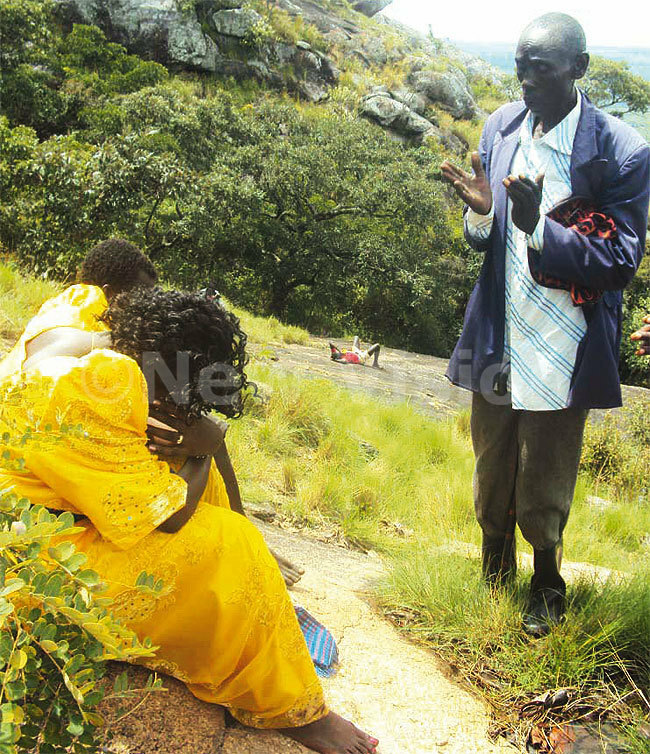
MP Evelyn Anite (Youth MP Northern) being prayed for by the Kakwa chief, Kassim Alumbi, at Mt. Liru in Koboko district last year
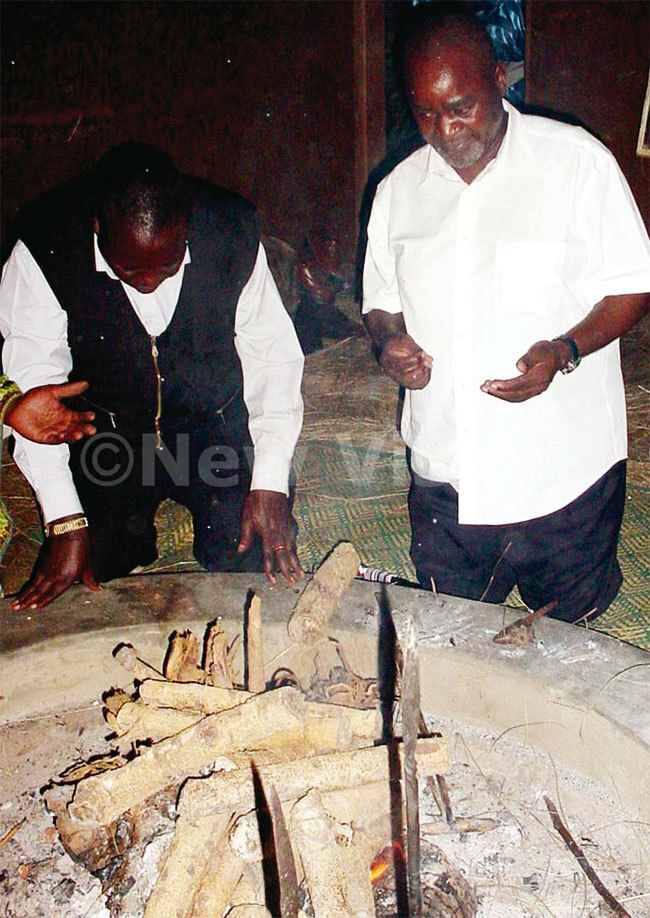
Former Ugandan vice-president Prof. Gilbert Bukenya praying in a shrine in 2004
No law in place
The law on witchcraft is inadequate. Appearing before MPs recently, the deputy Attorney General, Fred Ruhindi, wondered why the health ministry was still dragging its feet over a Bill to control the practice.
The practice of witchcraft is illegal in Uganda and any person who practises it or who holds himself or herself out as a witch, whether on one or more occasions, commits an offence and is liable, on conviction, to imprisonment for a period not exceeding five years.
“You should summon the health minister [Dr. Ruhakana Rugunda] to explain why he has not brought the Bill to Parliament. We don’t need a new law, but the existing law (Act enacted in 1957) is problematic to implement by the Constitutional Court because it’s impossible to prove that one is a witch. This Bill will make the existing law enforceable,” Ruhindi said.
The leader of traditional healers in Uganda, Sylvia Namutebi, also known as Maama Fina, under her organisation Obuwangwa n’eddagala Lyaffe, recently said the current Witchcraft Act lumps them together with witches, yet their work is different.
A traditional healer demonstrates the power of spirits
Retired Bishop Eria Paul Luzinda says: "The problem of people getting involved in witchcraft to prosper is bigger than what meets the eye, because it cuts across sectors. Belief in witchcraft is attributed to the failure of religious leaders to preach the gospel that changes the hearts of Christians.
"Many Christians give offertory in churches, when deep inside their hearts, God does not prevail. Christianity was not indigenised in the African traditional culture, that is why seemingly ‘staunch’ believers still hobnob with their cultural practices."
(Additional reporting by Dismus Buregyeya and Moses Bikala)